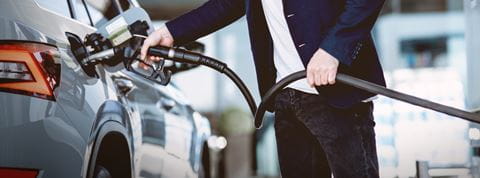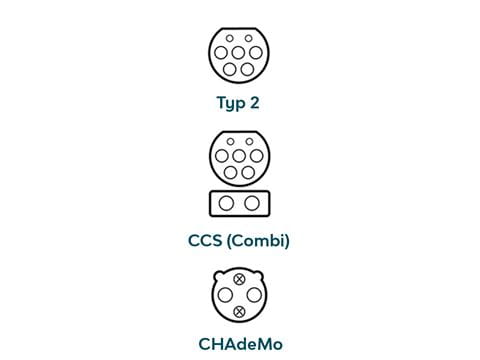
Charge and fuel card service
As a partner to Switzerland's biggest oil companies, drivers with customers of Ayvens are presented with charge and fuel cards. These cards can be used to charge and to buy fuel and other approved products from all partner service stations. Products and other services procured are invoiced at the end of each month. A detailed breakdown shows you where, when and how much has been consumed for each vehicle.
Specific advantages at a glance:
- Administrative support: Ayvens performs all the formalities involved in ordering and exchanging fuel cards.
- Ease of handling: All charging and refuelling transactions are recorded in a monthly invoice, independently of the suppliers.
- Flexibility: You determine the usage scope of your charge and fuel cards, enabling you to pay for toll charges, purchases from petrol station shops, car washes and other services.
- Security: All cards have their own PIN code (or a standard company PIN code). Lost or stolen cards are immediately blocked, and new cards are issued.
- Monitoring: The collective monthly invoice enables you to keep track of all services efficiently, and to pinpoint any anomalies quickly. overseeing the fuel consumption of every vehicle is simplicity itself.
The available charging and refuelling cards
Shell With the Shell Card, you can use around 750 stations from Shell, Agrola and Migrol (Ticino) in Switzerland. The Shell Card is also accepted by Shell and partners across Europe in a comprehensive network of around 22'000 stations. Shell is constantly working to offer you an ever larger network of petrol stations with selected partners, e.g. soon through a partnership with ENI. **Shell e-mobility** In addition to petrol, the Shell Card also offers mobility for electric and hybrid vehicles. There are over 5'000 charging points available in Switzerland and over 150'000 in Europe. **Shell and Shell Recharge Solutions** In order to make sensible use of electric mobility, charging facilities are needed at the company and/or at drivers’ homes. Together with our experienced partner Shell Recharge Solutions, we are happy to advise companies on the topics of infrastructure and billing options. **Other Shell Card benefits** Shell CO₂ compensation Offset unavoidable CO₂ with the Shell Card and support certified offsetting projects around the world. Shell SmartPay Discover the future at the petrol pump with the secure and contactless digital payment service of the Shell Card.Swisscharge With the Swisscharge card, you can charge your electric or hybrid vehicle at more than 17,000 charging points in Switzerland and over 400,000 charging points across Europe.BP Plus The BP Plus fuel card is accepted as part of the ROUTEX alliance of brands that includes BP, ARAL, ENI, OMV, Circle-K and other affiliates. Watch out for the Routex Logo.Migrol The Migrolcard enables cashless refuelling, washing and payment in a network of around 370 petrol stations in Switzerland and the Principality of Liechtenstein. It is also accepted at Shell petrol stations with migrolino and mio shops.Coop Pronto With the Coop Pronto Company Card you can fill up at all Coop gaz stations 365 days a year.AVIA With the AVIA fuel card, you can refuel at the largest network of petrol stations throughout Switzerland safely and without cash.TAMOIL The TAMOIL CombiCard not only gives you privileged access to the TAMOIL service station network, but also to the Socar network. With over 440 service stations in Switzerland and the Principality of Liechtenstein, you can benefit from comprehensive coverage in all parts of the country.The fuel cards are easy to use:
- The card will be swiped through the card reader at the till.
- Your card has a personal ID number (PIN code). Enter your PIN.
- The card reader accepts your data once you have entered your vehicle’s mileage.
- Check the amount on the sales receipt and sign it, if necessary.
- You will be given a copy of the sales receipt for your records.
Important information for using your fuel card:
Always enter the current mileage of your vehicle in the card reader. When filling up a replacement car, please enter "999999".
Report the loss or theft of a fuel card immediately by sending an email to driverservice.ch@ayvens.com.
If you enter an incorrect PIN number three times, your fuel card will be temporarily blocked. It is not necessary to report a blocked card to Ayvens; it will be activated again automatically after 24 hours.

Make sure that the charging station offers the required plug type
Not every charging station offers the same plug types for charging.
These plug types exist:
- Type 2 plug (European standard) - this plug can provide a maximum charging power of 43 kW. It is used by most electric vehicles and charging stations in Europe.
- CCS (Combo) plug (European standard) - this is a so-called ‘fast charger’ that can transmit up to 350 kW of power. This plug has become widely accepted for European electric vehicles, and Tesla is now also using it for its European Model 3. Most fast-charging stations offer this plug.
- CHAdeMo plug - this is the Japanese counterpart to the CCS plug. The plug is therefore mainly used in vehicles from Japanese manufacturers. This plug is not available at all fast-charging stations.
